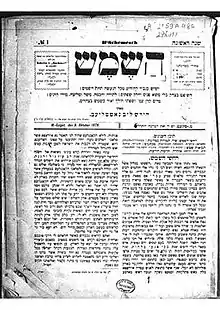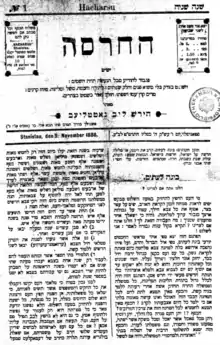Hersh Leib Sigheter (1829–1930[1]), pen name of Hersh (Hirsch) Leib Gottlieb גוטליב (or Gottlieb גאטטליעב[1]) was a Hungarian Jew from today's Sighetu Marmaţiei, Romania (Hungarian: Sziget or Máramarossziget) who, even before the advent of what is generally considered to be professional Yiddish theater, wrote satirical Yiddish-language Purim plays on an annual basis and hired boys to play in them. Although often objected to by rabbis, these plays were popular, and were performed not only on Purim but for as much as a week afterwards in various locations.[2]


Under his own name, Gottlieb was also a famous translator, journalist and editor of newspapers in Sziget and Kolomyia (now in Ukraine). He founded what was effectively the first Hungarian weekly in Hebrew in 1878[3] in Sziget called "The Sun" (השמש).[4] As of 1887, after having been expelled by Rabbi Chananyah Yom Tov Lipa Teitelbaum of Sziget, he continued to publish it, in Kolomyia, alternating between the two names HaShemesh (השמש) and HaCharsah to avoid an Austrian tax on weekly newspapers.[5] He also published from 1893 to 1913 his "Jüdische Volkszeitung" (ייִדישע פאָלקסצײַטונג), Jewish People's Paper in Yiddish, from 1902 to 1914 his weeklies, Zion and Love of Zion (Ahavat Tzion אהבת ציון, together with Elijahu Blank) a bilingual Hungarian-Yiddish official Zionist newspaper,[6] as well as his monthly "Die Wahrheit" (The Truth) in Hebrew in 1896.[1] "Zion" is considered as the first Hungarian Zionist newspaper, which was sponsored by Theodor Herzl.[7]
Notes
References
- Bercovici, Israil, O sută de ani de teatru evreiesc în România ("One hundred years of Yiddish/Jewish theater in Romania"), 2nd Romanian-language edition, revised and augmented by Constantin Măciucă. Editura Integral (an imprint of Editurile Universala), Bucharest (1998). ISBN 973-98272-2-5. See the article on the author for further publication information.
- N. M. Gelber (Jerrold Landau, trans.), "The History of the Jews of Stanisławów"; p. 32–43 accessed online 2009-11-14.
- Herman Dicker, "Piety and Perseverance - Jews from the Carpathian Mountains", with a foreword by Elie Wiesel, Sepher-Hermon Press, Inc. New York (1981). ISBN 0-87203-094-6.
- Ch. D. Lippe, Bibliographisches Lexicon der gesammten jüdischen Literatur der Gegenwart, Verlag von D. Löwy, Wien (1881).
- Zylbercweig, Zalmen, Leksikon fun yidishn teater, Vol. 1, p. 141, Adapted from the original Yiddish text: accessed online 2014-01-13.
- S. R. Komoróczy, "Kárpátaljai zsidó sajtó", in: Zsidók Kárpátalján – Történelem és örökség a dualizmustól napjainkig, Budapest (2013).